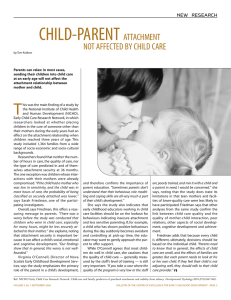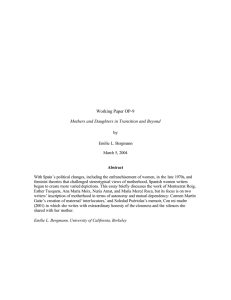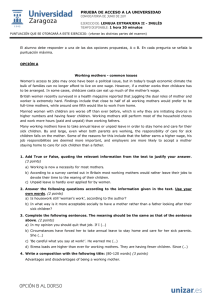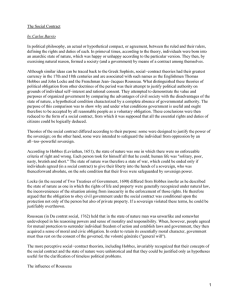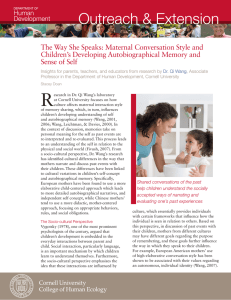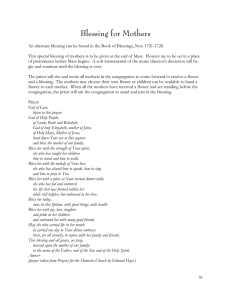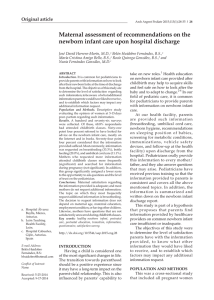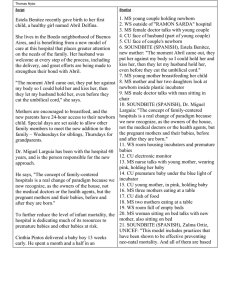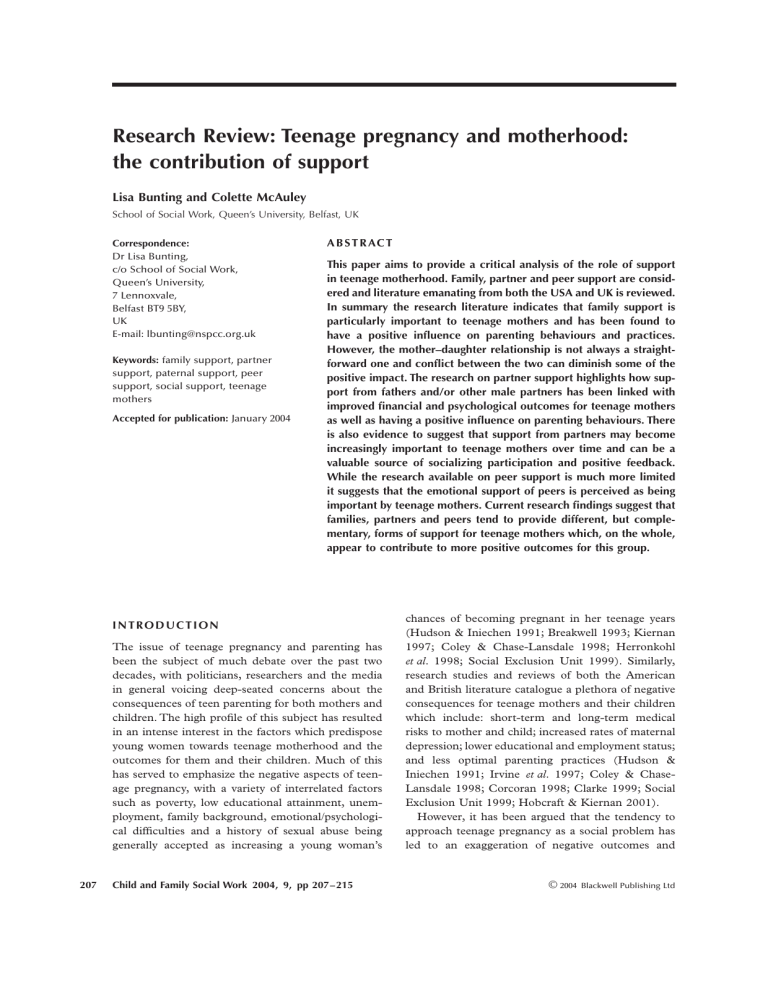
Blackwell Science, LtdOxford, UKCFSChild and Family Social Work1365-2206Blackwell Publishing Ltd, 2004May 200492207215Research ReviewResearch Review: Teenage pregnancy and motherhood: the role of support L Bunting and C McAuley Research Review: Teenage pregnancy and motherhood: the contribution of support Lisa Bunting and Colette McAuley School of Social Work, Queen’s University, Belfast, UK Correspondence: Dr Lisa Bunting, c/o School of Social Work, Queen’s University, 7 Lennoxvale, Belfast BT9 5BY, UK E-mail: [email protected] Keywords: family support, partner support, paternal support, peer support, social support, teenage mothers Accepted for publication: January 2004 A B S T R AC T This paper aims to provide a critical analysis of the role of support in teenage motherhood. Family, partner and peer support are considered and literature emanating from both the USA and UK is reviewed. In summary the research literature indicates that family support is particularly important to teenage mothers and has been found to have a positive influence on parenting behaviours and practices. However, the mother–daughter relationship is not always a straightforward one and conflict between the two can diminish some of the positive impact. The research on partner support highlights how support from fathers and/or other male partners has been linked with improved financial and psychological outcomes for teenage mothers as well as having a positive influence on parenting behaviours. There is also evidence to suggest that support from partners may become increasingly important to teenage mothers over time and can be a valuable source of socializing participation and positive feedback. While the research available on peer support is much more limited it suggests that the emotional support of peers is perceived as being important by teenage mothers. Current research findings suggest that families, partners and peers tend to provide different, but complementary, forms of support for teenage mothers which, on the whole, appear to contribute to more positive outcomes for this group. INTRODUCTION The issue of teenage pregnancy and parenting has been the subject of much debate over the past two decades, with politicians, researchers and the media in general voicing deep-seated concerns about the consequences of teen parenting for both mothers and children. The high profile of this subject has resulted in an intense interest in the factors which predispose young women towards teenage motherhood and the outcomes for them and their children. Much of this has served to emphasize the negative aspects of teenage pregnancy, with a variety of interrelated factors such as poverty, low educational attainment, unemployment, family background, emotional/psychological difficulties and a history of sexual abuse being generally accepted as increasing a young woman’s 207 Child and Family Social Work 2004, 9, pp 207–215 chances of becoming pregnant in her teenage years (Hudson & Iniechen 1991; Breakwell 1993; Kiernan 1997; Coley & Chase-Lansdale 1998; Herronkohl et al. 1998; Social Exclusion Unit 1999). Similarly, research studies and reviews of both the American and British literature catalogue a plethora of negative consequences for teenage mothers and their children which include: short-term and long-term medical risks to mother and child; increased rates of maternal depression; lower educational and employment status; and less optimal parenting practices (Hudson & Iniechen 1991; Irvine et al. 1997; Coley & ChaseLansdale 1998; Corcoran 1998; Clarke 1999; Social Exclusion Unit 1999; Hobcraft & Kiernan 2001). However, it has been argued that the tendency to approach teenage pregnancy as a social problem has led to an exaggeration of negative outcomes and © 2004 Blackwell Publishing Ltd Research Review: Teenage pregnancy and motherhood: the role of support L Bunting and C McAuley resulted in the positive aspects of teenage motherhood being ignored (Phoenix 1993; Coleman 1998). Equally it has also been argued that the presence of social support tends to ameliorate many of the negative outcomes often associated with teenage parenthood (Furstenburg & Crawford 1978; Barth et al. 1983). Given that social support has the potential to improve outcomes for teenage mothers the aim of this paper is to critically analyse the literature on social support and the role this plays in teenage motherhood. More specifically it will examine the literature on three types of social support, that of family, partner and peers. FA M I L Y S U P P O R T While the literature on social support is nowhere near as extensive as that on predisposing factors and outcomes, the role of family support is by far the most commonly researched type of support within the literature. Within this, the role of support from the maternal grandmother, in particular, has been widely investigated. Caldwell & Antonucci’s (1997) review of American literature suggests that, as a majority of teenage mothers live with their mother for up to five years after giving birth, grandmothers are a primary source of housing, financial and child-care assistance. Co-residence with grandmothers has also been linked with increased educational attainment and stable employment for young mothers as well as better parenting and child developmental outcomes for their children. However, the review also suggests that racial variations exist in the benefit of support for African American and White teenage mothers. Living with grandmothers has been associated with more behaviour problems for the children of White teenagers but not for those of African American teenagers. African American teenage mothers have also been found to be less likely to live with the father of their baby and more likely to remain at home with their family than White teenage mothers. This is supported by Henly’s (1997) investigation into the impact of family structure and support on both African American and White American teenage mothers’ well-being. The researchers identified six family structures which included a nuclear family structure, three multi-adult family structures, teenagers living on their own and teenagers residing with partners. The study found significant differences between the family structures utilized by African American teenage mothers and those utilized by White teenage mothers. Forty-three per cent of Afri- 208 Child and Family Social Work 2004, 9, pp 207–215 can Americans compared with 17% of Whites were living in one of the three multi-adult structures with either their mother, their mother and another adult or another adult only. Within this, 21.5% of African American teenage mothers compared with 6.2% of Whites were residing with their mother while a further 9.2% of African American and 5.5% of Whites were living with their mother and another adult. About one-sixth of both groups resided in the nuclear family structure with both their mother and father while 37.4% of the African American sample and 28.8% of the White sample reported living alone. The study also found that White respondents were much more likely to be living with a male partner or husband than African American teenage mothers. However, while the researchers found evidence of great variety in family structure across the two ethnic groups, the sample proved to be more similar with respect to the provision of different types of support. Three-quarters of the sample, both African American and White teenagers, reported that they could expect to receive some form of emotional support, while over 90% reported using informal child-care arrangements. There were no significant differences between the two ethnic groups, with an overall 56.5% reporting weekly access to child care. With regard to financial support, a total of 26.1% reported some form of non-welfare financial assistance. There were significant differences across racial groups, with 34.2% of Whites receiving financial support compared with only 15% of African Americans. When the data were analysed for the impact of family structure on support the researchers found that family structure tended to be more important for White teenage mothers than for African American ones. In particular, White respondents who were married or cohabiting did not fare as well as those who were not living with their partners, tending to economically worse off than those residing with their parents and having poorer long-term work aspirations. This would suggest that while marriage and cohabiting represent a move towards independent family formation for teenage mothers it may also limit the amount and quality of support available. Living in multi-adult family structures appeared to have no negative impact on support, with all three being equally supportive to maternal well-being for both groups. With regard to the impact of support on wellbeing measures, the study found that African Americans who reported less emotional support were significantly more likely to report poorer grades and greater financial insecurity. For White respondents there was © 2004 Blackwell Publishing Ltd Research Review: Teenage pregnancy and motherhood: the role of support L Bunting and C McAuley little association between emotional support and other dependent variables, although child-care utilization was found to be related to better education outcomes for this group but not African Americans. Overall the provision of support had a stronger relationship to maternal well-being than any other independent variable, confirming the importance of such support for all teenage mothers. Racial differences in support suggest that African American teenage mothers have much less access to informal financial support, leading to greater financial insecurity. This may partially explain the higher incidence of residence with family member or other adults, aside from partners, as an economic coping strategy for this group. The relationship between emotional support and educational outcomes for African American teenage mothers may also be attributed to differing aspirations for this group, suggesting that they may require additional support and encouragement with regard to educational needs. By contrast, the tendency for White teenage mothers to have higher longterm work aspirations may result in a greater need for practical support in the form of child care rather than emotional support. While the research is limited by a lack of analysis into the processes of support and its dynamics within certain family structures, the study highlights how residence with parents, mothers and/or other adults can benefit teenage mothers of both races. Although it has been suggested that marriage is the single most effective means of improving the economic situation of teenage mothers (Corcoran 1998), Henly’s (1997) study has found that the opposite may be true. The study also highlights how ethnic differences can impact on the types of support teenage mothers need and how financial assistance may be a particular area of need for African American mothers. While Henly’s (1997) study focuses on the impact of family structure on emotional, financial and childcare support, Dellman-Jenkins et al. (1993) provide a more in-depth exploration into who young, American mothers are likely to turn to for these types of support. Sixty-one per cent of the 60 mothers reported that they were most likely to turn to their own mothers for assistance with child care, 49% for financial support and 21% for emotional support. The 18 mothers of parenting teenagers who took part in the study also perceived themselves as playing a significant support role in their child’s life. A majority (77%) felt that their children were most likely to turn to them first not only for all three types of support but also for any type of support. 209 Child and Family Social Work 2004, 9, pp 207–215 However, when asked to identify areas of need that would enhance their parenting, 35% of the teenage mothers stated that they needed more emotional support from family and friends, 30% that they required more financial assistance and 20% that they required reliable babysitting. A further 45% went on to identify assistance with obtaining employment and better decision-making skills as areas of need. Similarly 30% felt that they would benefit from budgeting knowledge and 15% that they required further child development knowledge. While it is clear that families can provide a strong source of support for teenage mothers, other studies which explore support from an interpersonal perspective produce more ambiguous findings. Nitz et al. (1995) assessed the role of stress, interpersonal conflict, social support and family relationships with 75 African American teenage mothers. The study utilized the buffering theory of social support as a framework within which to explore the issue. This theory purports that where social support is higher, the teenage mother will experience less stress associated with parenting which, in turn, will have a positive impact on her parenting behaviour. Participants were asked to name individuals who met the six differing support functions of material aid, advice, positive feedback, physical assistance, social participation and discussion of private feelings. They were also asked to rate their satisfaction with that support as well as naming people who were sources of interpersonal conflict. Analysis revealed that while the teenager’s own mother was the most frequently identified provider and source of support, siblings were also reported as providing significant levels of support. However, while 89% of the sample named their mother as a source of support, 36% also said that their mother was a source of conflict for them. While the study did not investigate the nature of this conflict it is suggested that the teenager’s struggles for autonomy and independence, as well as disagreement over child-rearing practices and decisions, may be responsible. It is also suggested that conflict between mothers and daughters may be a proximity issue, with co-residence tending to lead to more conflict between the two. Although the study did not find an association between parenting stress and parenting behaviours, there was a significant relationship between interpersonal conflict and parenting behaviours. Teenagers with larger, conflicted networks tended to exhibit less optimal parenting behaviours while those with large, unconflicted support networks tended to exhibit more positive parenting behaviours. While the study © 2004 Blackwell Publishing Ltd Research Review: Teenage pregnancy and motherhood: the role of support L Bunting and C McAuley benefits from a high response rate of 85%, the use of a relatively small sample selected from those young women enrolled in parenting classes only, is a limitation. In addition, the cross-sectional nature of the study does not enable assessment of changes to the support network over time and how this may impact on parenting stress and behaviours. Despite these limitations the findings suggest that while social support from family members is a valuable asset to teenage mothers, the exchange is not a straightforward one, with interpersonal conflict negating some of the positive impact. The complexity of the supportive relationship between mother and daughter is further supported by the research of Voight et al. (1996), who investigated the effectiveness of social support networks in supporting 25 first-time African American teenage mothers. The study was longitudinal in nature and assessment took place when the children were 6 weeks, 6 months, 12 months and 18 months old. Analysis of the data revealed that female relatives were prominent members of the social support networks of urban African American teenage mothers. Again mothers were the most frequently mentioned source of positive support while male relatives other than brothers were noticeably absent. However, as with Nitz et al. (1995), support and conflict were not mutually exclusive, with the mother–daughter relationship being cited as the most frequent source of conflict as well as the most frequent source of support. Analysis also revealed that the more types of support provided by mothers the more optimal the teenage mother’s behaviour with her child was. However, the study also found that the more types of support provided by the mothers the more negative the experience of parenting for the teenage mothers. Thus it would appear that while support from their mothers helps teenagers to be better mothers themselves, the process is not an enjoyable one for the young women. Siblings were also found to be a source of both support and stress, while having more siblings and receiving more types of support from them was negatively related to parenting behaviour. Despite this finding, overall, larger support networks were found to be more beneficial to teenage mothers’ parenting experiences and behaviour. However, again, it would appear that the greater number of individuals in the support network who are a source of both support and stress is negatively related to parenting behaviour. While the findings of the study are limited by the small and selective nature of the sample, the results clearly support many of Nitz et al.’s (1995) findings. 210 Child and Family Social Work 2004, 9, pp 207–215 The finding that more types of maternal support is positively associated with parenting behaviour and negatively associated with parenting experience is particularly interesting. It suggests that advice and assistance, which may be well intended, may be perceived as intrusive by the teenage who is a mother, and by association an adult, in her own right. Similarly Caldwell & Antonucci’s (1997) review of the literature further supports the concept that coresidence and intergenerational support may create specific difficulties for the teenage mother. Research has found that better parenting is provided by grandmothers to very young teenage mothers than to older teenage mothers residing with them. Similarly a greater level of child-care provision from grandmothers has been negatively correlated with teenage mother’s self-esteem, while higher levels of family support have been found to reduce anxiety in young mothers when their child is 1 month old, but not when the infant is 8 months old. Thus it would seem that while family support has an important role in meeting a variety of needs for teenage mothers, the benefits of such support may diminish over time. By late adolescence, the need for support and the need for independence may conflict, resulting in diminished benefits of support in conflictual mother–teenage mother relationships. (Caldwell & Antonucci’s 1997, p. 231) While there has been extensive investigation into the role of the family and support networks for young mothers in America there has been considerably less investigation of this issue in the UK. Health Education Authority analysis of data on living arrangements, taken from surveys on smoking and pregnancy (Social Exclusion Unit 1999), indicate that, as in America, many families provide housing support for teenage mothers. The surveys revealed that seven out of ten 15–16-year-old mothers and 50% of 17–18-year-old mothers remain living at home with their families. However, aside from statistical evidence, there has been little investigation into the interpersonal dynamics of family support. The ‘Three Generations Study’ (Dennison & Coleman 1998) is one study which has made some attempt to explore this issue in order to better understand what characteristics of family relationships are associated with positive outcomes. Using an in-depth, qualitative approach the researchers interviewed 53 young mothers and their mothers living England. As the timing of interview varied from a few months post birth to a few years post birth, a variety of family structures were evident among the sample. Some of © 2004 Blackwell Publishing Ltd Research Review: Teenage pregnancy and motherhood: the role of support L Bunting and C McAuley the young mothers remained living at home, some had done so initially but had since established an independent household, others had lived apart from their families since the birth. The researchers found that although the relationship between the teenage mothers and the grandmothers varied greatly, they fell broadly into two groups defined by the age of the young mother. The mothers of older teenage mothers appeared to offer practical support with housework, money and babysitting but left nearly all aspects of child care to their daughters. The grandmothers saw themselves as a safety net, there to provide support when it was needed but leaving a majority of the responsibility up to the young woman. While the older teenage mothers saw themselves as adults and were keen to be independent, they also knew they could rely on the support of their mothers if they needed it. Many of the older teenage mothers were either living apart from their families or were planning to move out in the near future. However, the relationship between younger teenagers and their mothers was a more complex one in which independence from the grandmothers was less commonly asserted and there was greater reliance on her advice, practical help and support. Several of the younger teenage mothers saw themselves as being somewhere between a teenager and an adult, a view often echoed by their mothers who recognized that their daughter needed to enjoy normal teenage activities as well as taking responsibility for her child. Getting the balance between the two was an issue for many grandmothers, and while they saw their advice and support as necessary for the welfare of the child a large number were anxious not to take over. Although some young mothers did perceive their mother’s help as interference they generally saw the necessity for her help and few expressed anything but moderate levels of conflict. Many of the grandmothers looked after the child while their daughter attended school or college, and several had had to give up their jobs to facilitate this. This sometimes led to a feeling of being trapped and not in control of their own lives, and several indicated that they themselves lacked social support. While the findings of this study are limited by the use of a small qualitative sample, the in-depth nature of the study reveals that many of the issues pertinent in America apply to young mothers in Britain also. The study highlights the importance of grandmother support in a variety of areas while confirming that the need for high levels of support may decrease over time as the young mother becomes more independent. It also highlights how pregnancy has a major impact not 211 Child and Family Social Work 2004, 9, pp 207–215 only on the teenagers but also on their mothers, who may have to make their own sacrifices to help their daughters and may feel unsupported themselves. PA R T N E R S U P P O R T While research into the role of family support and teenage motherhood is relatively common, investigation into the role of partner support is often conspicuous by its absence. Research into this type of support is further hampered by the less than precise nature of the term ‘partner’, which is often taken to include current boyfriends as well as biological fathers, who may, or may not, reside with the teenage mother and child. However, despite a lack of comprehensive work in this area there are a number of studies which provide useful insights into the supportive role of fathers. Roye & Balk’s (1996) review of the American literature on partner support indicates that this type of support, whether from the baby’s father or from a significant other, is related to higher self-esteem scores when the teenager feels that her support needs are being satisfied. The review also explores the relationship between partner support and a variety of outcomes for teenage mothers including economic and educational outcomes and psychological wellbeing. The results indicate that while marriage or cohabitation with a biological or surrogate father can economically benefit the young mother and her child, low marriage rates and high levels of relationship breakdown negate much of the positive impact. It is suggested that economic difficulties prevent young men from entering into marital or cohabiting relationships, and thus the better economic circumstances of such couples may be due to their being financially better off in the first place, rather than to the living arrangement. Equally, while partner support is thought to improve the economic situation of teenage mothers, it has also been associated with non-completion of schooling for this group. Roye & Balk’s (1995) review of American research has found that African American and Caucasian teenage mothers who are married or living with a boyfriend are more likely to drop out of school (Unger & Cooley 1992; Warrick et al. 1993). Similarly, a study of Hispanic and African American teenagers (Roye 1994) found that boyfriend support was significantly correlated with school drop-out rates. While the reasons for this association remain unclear it has been suggested that male partners may encourage young women to truant because they worry about their meeting other men in school (Warrick © 2004 Blackwell Publishing Ltd Research Review: Teenage pregnancy and motherhood: the role of support L Bunting and C McAuley et al. 1993). With regard to psychological well-being, some studies have shown that partner support increases the self-esteem of teenage mothers and reduces depressive symptomology. However, others have reported a more mixed effect on maternal psychological health, suggesting that some partners may be a source of stress and conflict for the young women which may, in extreme cases, result in abusive and self-destructive relationships. As well as exploring the impact of partner support some research has focused on changes in support over time. Gee & Rhode’s (1999) longitudinal study explored changes in partner and maternal support over a one-year period. At the first stage of the study 375 teenagers, 70% of whom were pregnant and 30% of whom had recently given birth to their first child, were interviewed. Approximately one year later, data were gathered from 75% of the initial sample, with 67% agreeing to participate. The study found that teenage mothers experience significant postpartum changes in their social support networks, with teenagers nominating fewer individuals as supportive at Time 2 than Time 1. Although mothers and partners remained most frequently nominated sources of support at both interviews, this fell from 84% to 75% for mothers and from 69% to 44% for fathers by the time of the second interview. Teenage mothers also reported that their mothers provided less emotional and tangible support and were an increased source of strain. At Time 2 partners provided more support relative to mothers and by this stage the young mothers rated them as equally important sources of support. This suggests that as maternal support decreases other aspects of support provided by partners, such as socializing and positive feedback, become increasingly important to teenage mothers. The authors fit this within a developmental perspective in which romantic ties take on increasing prominence relative to mothers over time. It is also suggested that these changes may be due to mothers encouraging their daughter to take on a majority of parental responsibility, although it is recognized that these young women still continued to receive a substantial amount of maternal postpartum support. However, despite the growing prominence of male partners in the support network, only 17% of the young mothers remained with the same partner over time. This would suggest that few of the young women were still in a romantic relationship with the father of their baby by the time of the second interview. The study also found that relationship disruption had a negative impact on young mothers, with those teen- 212 Child and Family Social Work 2004, 9, pp 207–215 agers who ended a relationship in the first postpartum year experiencing a greater number of negative life events than those who had never had a male partner. However, those young women who sustained a relationship over the course of the first postpartum year showed lower levels of depression than the other young women in the sample. While the findings of this study are limited by use of a predominantly African American sample recruited from one specific setting, they would seem to indicate that definite changes occur in the support networks of young mothers. Male partners appear to play an increasingly important support role for young mothers as time passes, with greater psychological benefits being derived from stable relationships. While mothers still remain the most prominent members of the support network, it would seem that young women look to their partners for other aspects of support and place equal value on this support as that provided by mothers. While Gee & Rhode’s (1999) study did not differentiate between partner support and paternal support, Brunelli et al.’s (1995) research particularly focused on the association of paternal support with maternal child-rearing attitudes. This American study used a sample of 144 Hispanic and African American teenage mothers and a comparison group of adult mothers, matched for socio-economic status, race and parity. With regard to family structure and paternal contact, the study found that: adult mothers in both ethnic groups were more likely to be living with the father; Hispanic women in both age groups were more likely to be living with the father; and, in keeping with previous research, African American teenage mothers were least likely to be living with the father. A further 34% of fathers were non-resident but involved with children, while 27% had little or no contact with their child. The study explored four types of support including instrumental support, emotional support and assistance with child care and housework. Although fewer African American fathers resided with mothers, they were found to provide more overall support than Hispanic fathers, although, not surprisingly, resident fathers provided significantly more support than nonresident fathers. The study also found that while support from grandmothers had little effect on maternal child-rearing attitudes, support from fathers had a more significant impact. Paternal support, in particular emotional support, was found to have the greatest impact, with the more emotional support the young women perceived from her partner the less likely she was to endorse power-assertive child-rearing atti- © 2004 Blackwell Publishing Ltd Research Review: Teenage pregnancy and motherhood: the role of support L Bunting and C McAuley tudes. Although these findings indicate that paternal support is important to young mothers and can have more of an impact on child-rearing attitudes than maternal support, they also show that grandmothers still provide significantly more support one year after birth than fathers. With regard to maternal support, the results indicated that, as with fathers, resident grandmothers provided higher levels of instrumental and emotional support than non-resident grandmothers. African American resident grandmothers also tended to provide more instrumental and emotional support than Hispanic resident grandmothers. Comparison of both paternal and maternal support over the four categories indicated that overall grandmothers provided significantly more support than did fathers. This differs from the findings of Gee & Rhode (1999) and may be attributable to a number of factors, such as different sample size and ethnic composition, the use of different support categories and a cross-sectional as opposed to longitudinal research design. Whilst highlighting the value of paternal support for young mothers, Brunelli et al.’s (1995) research also confirms how ethnicity and family structure can have an impact on the level and types of support available to young women. A study of the factors influencing decisions about pregnancy and living arrangements (Allen & Bourke Dowling 1998) also provides support within the British context that maternal grandmothers tend to provide more support than fathers. The research found that while 70% of the 84 teenage mothers interviewed had discussed the future of their pregnancy with husbands or partners, a significant minority had not. Of the 59 women who discussed the pregnancy with their partner or husband, only nine had found them the most helpful and, indeed, the mothers were more likely to identify them as unhelpful or unsympathetic, with a lack of partner support being a particular issue for some women. A small number of the mothers identified their partner as providing the most practical support while around a quarter thought they had provided the most financial support. The authors summarized their detailed findings by concluding that parents tended to receive a much higher rating than partners in terms of helpfulness, sympathy, practical assistance and financial support. They concluded that most husbands and partners did not seem to play a major role in the decision to continue pregnancy or in supporting the women throughout their pregnancy. The authors also noted that many of the men who had dissuaded the mothers from terminating their 213 Child and Family Social Work 2004, 9, pp 207–215 pregnancy by promises of support were no longer involved with the teenage mother or child at the time of interview, some 21 months later. PE E R S U P P O R T The role of peer support in teenage motherhood is an area of research that has received much less attention than that of family support or even partner support. Despite a lack of prominence in the research agenda, several of the previously mentioned studies have investigated peer support as part of the wider social network of teenage mothers. Voight et al. (1996) found that friends were numerous in the mothers’ support networks and were likely not only to share social activities with the mother but also to provide positive feedback and advice that is not characterized by the conflict often present in mother–daughter relationships. Friends can provide special type of self-affirming support that is not usually accompanied by the setting of standards and provision of criticism that is inherent in relationships with parents and sometimes siblings and partners… In fact, friends may help buffer adolescents from the pressures and problems of family. (Voight et al. 1996, p. 69) The study also found that the numbers of friends providing support was a predictor of parenting behaviour. The authors hypothesize that peer support may not be a causal factor resulting in improved parenting practices but rather that greater numbers of friends may reflect greater social competence on the part of the young mothers. The social skills necessary to maintain friendship networks may in turn be the same skills the mothers applies to her interaction with her child. Similarly, Nitz et al. (1995) found that friends were the second most frequently identified provider and source of support, while Dellman-Jenkins et al. (1993) found that friends played a key role when adolescents needed someone to talk to about daily activities or emotional support. However, while these studies provide a positive perspective on peer support the issue is explored only as a minor aspect of wider support networks. Richardson et al.’s (1995) research differs in that it focuses specifically on peer support and provides a comparative analysis with family support. Analysis of the interview and questionnaire data provided by 46 teenage mothers confirmed that peers were an important source of emotional support for adolescent mothers. In fact, the perceived emotional support of friends surpassed that of parents and other © 2004 Blackwell Publishing Ltd Research Review: Teenage pregnancy and motherhood: the role of support L Bunting and C McAuley family members. The study also found that social support from peers was significantly related to a reduction in parenting stress, particularly with regard to the high levels of emotional support provided by this group. While Richardson et al.’s (1995) study confirms the important role friends can have in supporting adolescent mothers, the findings are, however, limited by a small sample size and very low response rate. It is possible that the group who did not respond may have very different characteristics from those who did, and that fewer friends and fewer social skills might make young mothers more unlikely to participate in the research process. However, in light of the findings of other studies it would appear that peer support is particularly important in meeting the emotional needs of teenage mothers. Support from friends combines with family and partner support to contribute to the increased mental well-being of teenage mothers by decreasing parenting stress and providing avenues for positive interaction and feedback. CONCLUSION Support, in particular family support, is clearly important to teenage mothers, with the person they most rely on for practical and child-care support being their own mother. While the level of support available may vary by the age, race and place of residence of the teenage mothers, maternal grandmothers appear to have a positive influence on the parenting behaviour and practices of this group. However, the relationship between mother and daughter is not a straightforward one and it would appear that high levels of support from grandparents may be related to a poorer experience of parenting for teenage mothers themselves. Similarly, conflict between the teenage mother and other family members has been found to diminish some of the positive impact of family support and has been associated with less optimal parenting behaviours. The potential for conflict in interpersonal relationships may also increase with time, with older teenage mothers wanting to assert their independence and be less reliant on their mothers for assistance and advice. However, a majority of these findings originate from America and there has been limited research into the dynamics of family support with the UK. That which has been done shows similar results, highlighting how grandmothers themselves are aware of the potential for conflict and struggle to maintain a balance between helping their own child and recognizing that she is a mother in her own right. Similarly the 214 Child and Family Social Work 2004, 9, pp 207–215 issue of partner support is one that has remained almost completely neglected by British research. American enquiry has suggested that partner/paternal support is linked with improved financial and psychological outcomes but lower educational attainment for teenage mothers. Exploration of the issue in comparison with other types of support has found that while maternal grandmothers may provide quantitatively more support, partner/paternal support becomes increasingly important to the teenage mothers over time. Specifically, emotional support from partners has been found to be an important aspect of support for teenage mothers and has been related to better parenting practices. Peers also appear to play an important role in emotionally supporting the teenage mother, although there is much less research on this particular type of support. It is suggested that peer support provides positive feedback and advice for young mothers which is not characterized by the same conflict often present in mother–daughter relationships. However, while support from family members, partners and peers may often provide a complementary combination of support for teenage mothers, investigation of the support provided to teenage mothers within the British context has been limited. Likewise there has been limited investigation into changes to the support network over time, although some American research suggests a decrease in the level of maternal and partner support during the first postnatal year. Recent research in Northern Ireland (Bunting 2003) has explored the needs and supports available to teenage parents from the perspective of both professionals and teenage mothers. In relation to the provision of informal support to teenage mothers, this study found that a majority of health visitors thought that the teenage mothers on their caseloads received high levels of support from their family and friends. Sixty per cent thought that the father provided support while half thought that the father’s family also provided support. Similarly, almost all of the teenage mothers interviewed reported receiving support from their families, while around three-quarters rated both the fathers and their families as supportive. Where support was provided by these groups, the teenage mothers rarely perceived a decrease in the level of assistance over time. REFERENCES Allen, I. & Bourke Dowling, S. (1998) Teenage Mothers: Decisions and Outcomes. Policy Studies Institute, London. © 2004 Blackwell Publishing Ltd Research Review: Teenage pregnancy and motherhood: the role of support L Bunting and C McAuley Barth, R.P., Schinke, S.P. & Mazwell, J.S. (1983) Psychological correlates of teenage motherhood. Journal of Youth and Adolescence, 12, 471–487. Breakwell, G.M. (1993) Psychological and social characteristics of teenagers who have children. In: The Politics of Pregnancy (eds A. Lawson & D.L. Rhode). Yale University, New Haven. Brunelli, S.A., Wasserman, G.A., Rauh, V.A., Alvarado, L.E. & Caraballo, C. (1995) Mothers’ reports of paternal support: associations with maternal child-rearing attitudes. MerrillPalmer Quarterly, 41, 152–171. Bunting, L. (2003) Teenage parenting: professional and personal perspectives. Unpublished doctoral thesis, Queen’s University, Belfast. Caldwell, C.H. & Antonucci, T.C. (1997) Childbearing during adolescence: mental health risks and opportunities. In: Health Risks and Developmental Transitions during Adolescence (eds J. Schulenberg et al.), pp. 220–245. Cambridge University Press, Cambridge. Clarke, L. (1999) Young mothers and their families: trends, associated factors and consequences. In: Promoting the Health of Teenage and Lone Mothers: Setting a Research Agenda. HEA, London. Coleman, J. (1998) Teenage parenthood. Children and Society, 12, 306–314. Coley, R.L. & Chase-Lansdale, P. (1998) Adolescent pregnancy and parenthood. American Psychologist, 53, 152–166. Corcoran, J. (1998) Consequences of adolescent pregnancy/ parenting: a review of the literature. Social Work in Health Care, 27, 49–67. Dellman-Jenkins, M., Hagey Sattler, L. & Richardson, R. (1993) Adolescent parenting: a positive and intergenerational approach. Families in Society (The Journal of Contemporary Human Services), December, 590–601. Dennison, C. & Coleman, J. (1998) Teenage motherhood: experiences and relationships. In: Psychological Perspectives on Pregnancy and Childbirth (ed. S. Clement). Churchill Livingstone, London. Furstenburg, F.F. & Crawford, A.G. (1978) Family support: helping teenage mothers to cope. Family Planning Perspectives, 10, 322–333. Gee, C. & Rhodes, J. (1999) Postpartum transitions in adolescent mothers: romantic and maternal relationships. MerrillPalmer Quarterly, 45, 512–532. Henly, J. (1997) The complexity of support: The impact of family structure and provisional support on African American 215 Child and Family Social Work 2004, 9, pp 207–215 and White adolescent mothers’ well-being. American Journal of Community Psychology, 25, 629–655. Herronkohl, E.C., Herronkohl, R.C., Egolf, B.P. & Russo, M.J. (1998) The relationship between early maltreatment and teenage parenthood. Journal of Adolescence, 21, 291–303. Hobcraft, J. & Kiernan, K. (2001) Childhood poverty, early motherhood and adult social exclusion. British Journal of Sociology, 52, 495–517. Hudson, F. & Iniechen, B. (1991) Taking it Lying Down: Sexuality and Teenage Motherhood. Macmillan, Basingstoke. Irvine, H., Bradley, T., Cupples, M. & Boohan, M. (1997) The implications of teenage pregnancy and motherhood for primary healthcare: unresolved issues. British Journal of Medical Practice, 47, 323–326. Kiernan, K. (1997) Becoming a young parent: a longitudinal study of associated factors. British Journal of Sociology, 48, 406–428. Nitz, K., Ketterlinus, R.D. & Brandt, L.J. (1995) The role of stress, social support and family environment in adolescent mothers’ parenting. Journal of Adolescent Research, 10, 358–382. Phoenix, A. (1993) The social construction of teenage motherhood: a black and white issue. In: The Politics of Pregnancy (eds A. Lawson & D.L. Rhode), pp. 74–97. Yale University, New Haven. Richardson, R., Barbour, N. & Bubenzer, D. (1995) Peer relationships as a source of support for adolescent mothers. Journal of Adolescent Research, 10, 278–290. Roye, C.F. (1994) The Teenage Mothers-Grandmothers Program: A Follow-up Evaluation. Dissertation Abstracts International 5507A. Roye, C.F. & Balk, J. (1996) The relationship of partner support to outcomes for teenage mothers and their children. Journal of Adolescent Health, 19, 87–93. Social Exclusion Unit (1999) Teenage Pregnancy. Social Exclusion Unit, London. Unger, D.G. & Cooley, M. (1992) Partner and grandmother contact in black and white teenage parents families. Journal of Adolescent Health, 13, 546–552. Voight, J.D., Hans, S.L. & Bernstein, V.J. (1996) Support networks of adolescent mothers: effects on parenting experience and behaviour. Infant Mental Health Journal, 17, 58–73. Warrick, L., Christianson, J.B. & Walruff, J. (1993) Educational outcomes in teenage pregnancy and parenting programs: results from a demonstration. Family Planning Perspectives, 25, 148–155. © 2004 Blackwell Publishing Ltd


